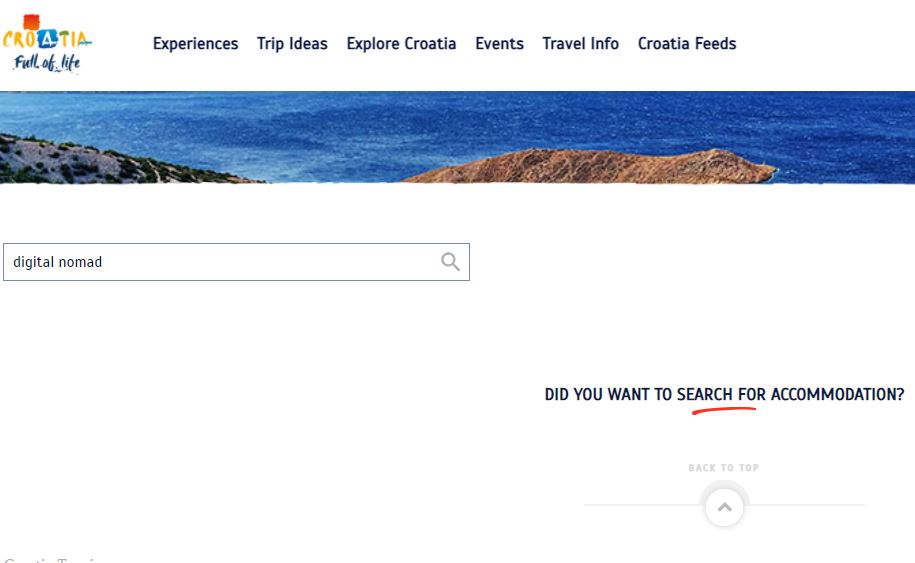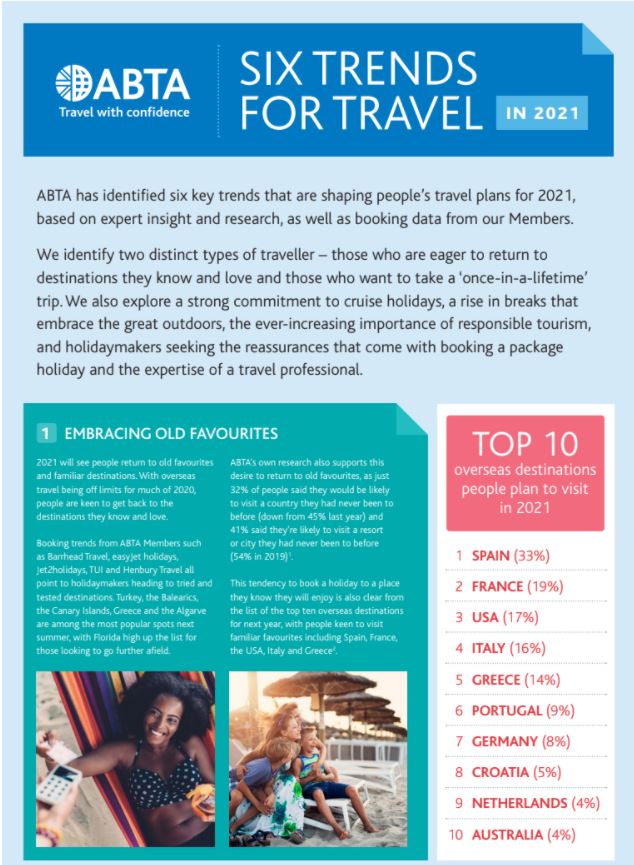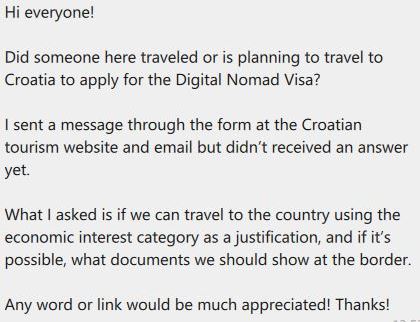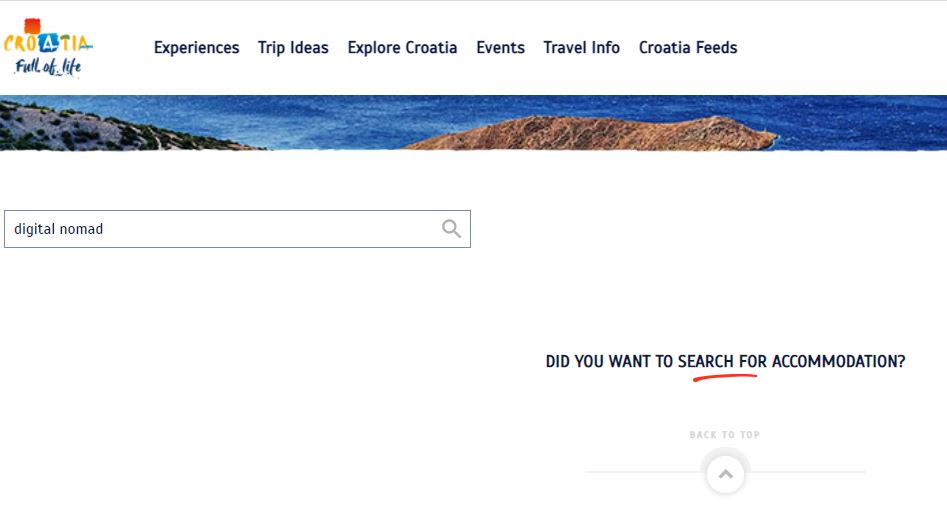Croatian Tourism Brand Recognisability Increases 50%, Says CTB Director Kristjan Staničić
ZAGREB, 6 March, 2021 - The brand awareness of Croatian tourism destinations on foreign markets has increased by 50% in the last seven years, the Croatian National Tourist Board (HTZ) director Kristjan Staničić has said in an interview with Hina.
The enhancement of the recognisability of the Croatian tourist industry is one of the targets of the last Croatian tourism strategic marketing plan and Staničić announces the preparation of the new plan for the 2021-2025 period this autumn.
Findings of the regular annual Brand Tracking survey conducted in late 2020 by the HTZ on ten European markets among 5,000 respondents aged 18 to 65 show that the brand awareness of Croatian tourist destinations increased from 3.3 in 2013 to 5.0 in 2020.
The respondents eligible for the survey were persons who had spent at least two nights on holidays abroad before the survey and who planned to travel abroad in the following five years.
In the survey, Croatia was compared to its Mediterranean peers -- Spain, Greece, Turkey and Italy, -- and our country fares best in terms of the preserved scenery and the value for money criterion.
The findings show that Croatia was also associated with terms such as security and family-friendly destination.
Staničić points out that Croatia was to the lowest degree associated with mass tourism, which he finds as a positive thing.
Croatian Tourism 2021 Preparations v Competition: The View from London
March 6, 2021 - How are preparations for the Croatian tourism 2021 season going compared to the competition? The view from London-based tourism professionals.
With lots of other exciting things happening in Croatia and elsewhere, and with more writers joining the expanding TCN team, I find myself writing less about tourism these days than in years gone by. My fascination with a country which generates more than 20% of its GDP from tourism, yet does almost nothing noteworthy (unless by noteworthy, you mean all the dumb stuff - there is PLENTY of that) to promote continues. And I wonder what this country could achieve - not only in tourism but in every sector of the economy - if it had more competent officials working more for the greater good and with genuine expertise.
I can't think of a clearer current example than an article I wrote last week comparing the efforts - and results - of one volunteer expat and the global promotion he achieved with zero kuna compared to the lack of presence of the state body with 70-80 employees and a budget of up to 400 million kuna annually, whose sole purpose is to promote Croatian tourism. Read more in Dutchman Promotes Croatia Globally: Meanwhile, in the Kingdom of Accidental Tourism...
There is still no information about the new digital nomad permit on the Croatian National Tourist Board that I can find. This is what you get when you search 'digital nomad'. There is also no information on the Ministry of Tourism website either. Indeed, much like last year and dealing with tourism during the pandemic, the only officials who have any information are the Croatian police and Ministry of the Interior.
CNN, Lonely Planet, Forbes and the Washington Post might be busy telling the world about new initiatives in Croatian tourism, but it seems that the bodies responsible for doing that have yet to figure it out. I guess it is only March, the season is so far away. Pomalo...
As I say, it fascinates me. But, as my business is not dependent on tourism, it doesn't bother me very much these days.
But it does bother those whose livelihoods are directly linked to tourism. I have received about 10 emails and messages from the UK from tourism businesses connected to Croatia in recent days, emails such as this:
Hi Paul, hope you are well. Do you think Croatia will be publishing any news to let the UK know they are open for business this summer? It’s been a few days now and we’ve still not seen anything here reassuring potential visitors they will be welcome. Unlike Greece which have featured in most news outlets recently. I got an email yesterday about the new Stay Safe Croatia campaign but I think there is a need for an Invite to be sent out for the summer as folks are not sure they will be welcome. Anything you can do to help?
Much more indepth was the following, which I received from a UK-based representative of a company that specialises in tourism to this region. I received it on March 1 (been a little busy here...) and I will publish it in full.
We want to remind everyone in the sector of the potential that Croatia has by sharing the latest trends. Things are starting to move in the travel sector, especially in the UK, and we should take this opportunity to attract more bookings from the active markets.
We attach the most recent surveys, ABTA reports, headlines from UK news and screenshots of Google trends we referred to in the text below.
About us:
Laura Milos Sanchez - In the travel industry for over 10 years, experienced in inbound and outbound travel, focused on the Croatian market for the past five years. She was born in Colombia and came to Croatia at an early age. She lives in London for the past 2 years and works in a well-known UK travel company specialized in luxury travel, looking after Croatia, Montenegro, and Slovenia, for 5 years, together with Sanja Stanisic. Sanja works remotely from Rijeka for the same UK travel company for the past 3 years, Sanja is a travel expert with extensive experience in Croatian tourism working in international DMC and travel companies for more than 8 years. We are both sales managers for the Balkans region (mainly Croatia, Slovenia and Montenegro) within the Mediterranean cluster of the company.
Travel reports show Brits are getting ready to travel, with a high number of travellers booking summer. Marketing promotions are coming from travel companies, tour-operator, newspapers, travel magazines and articles listing best travel destinations for summer 2021.
With 19.6 million people vaccinated, one in three adults in the UK (source BBC) and the PM announcing travel should be possible after the 18th of May, the UK market is getting very active and travellers are looking for their next destinations.
Though Croatia has been a desirable and popular destination for the last couple of years, in recent weeks we haven't seen much about Croatia in travel campaigns, articles, and news. At the moment we don't see Croatia appearing on the front page of travel companies, and it is rather appearing on the second or third page. Considering we are asked to stay at home, is difficult to notice the usual £49 Dubrovnik flight add on a London double-decker. Nonetheless compared to last years we feel there is less marketing around flights to Croatia and less news talking about summer in Croatia.
This could be because we still have the feeling is quite early, and everyone expects last-minute bookings. But reports show this is not the case. After a couple of calls to Croatian hoteliers, we noticed most of them were not aware things have started moving here in the UK. Lots of Brits will have both vaccines by summer and they may be looking into destinations that could have the best approach and rules for them to enter the country.
By Googling Croatia or travel to Croatia, in the UK, you won't see much. Other Mediterranean destinations are having lots of media coverage, mentioning specific outlines for the new covid season.
This type of information has been heavily followed by the news and reflect on the booking itself. Tour-operators have been focusing strongly on flights to Greece and Spain by offering them as top destinations.
Marketing campaigns showing how safe Croatia is, including the Stay Safe in Croatia, though WTTC is a very good starting point. Being labelled as a safe country that follows the principles of the WTTC should lead to a safe movement of tourist in 2021.
As important it will be to the vaccine as many people as possible and maintaining the good COVID numbers and by that making the guests feel safe in our destination, this year it will not be a deal maker as it was last year. Although this year the big focus is still on safe stay, for a very large number of guests logistics will be the most important part of their holidays and it will be equally important to establish a plan of safe movement and entry of tourists to the country.
Establishing these kinds of plans and announcing them through strong marketing campaigns while travel companies actively offering Croatia on their top destinations should create different momentum.
Labelling hotels, restaurants, museums etc. as safe is a reassuring thing for the guests to see, but that guest is already here where we want him to be. We should focus more on those guests who are yet indecisive, who weigh on where to escape this year on their so long-awaited and overdue holidays. That is also why we need to be present not only on official channels but should direct marketing to travel companies, OTA's, travel review sites, push much more towards those who are on the front line in bringing booking to our destination as in this covid "new world" everyone is holding on to the digital world more than before covid.
The race for early bird bookings has already started. Greece has seen very positive booking trends in the past 7 days since the UK has announced lifting the restrictions in the second half of May.
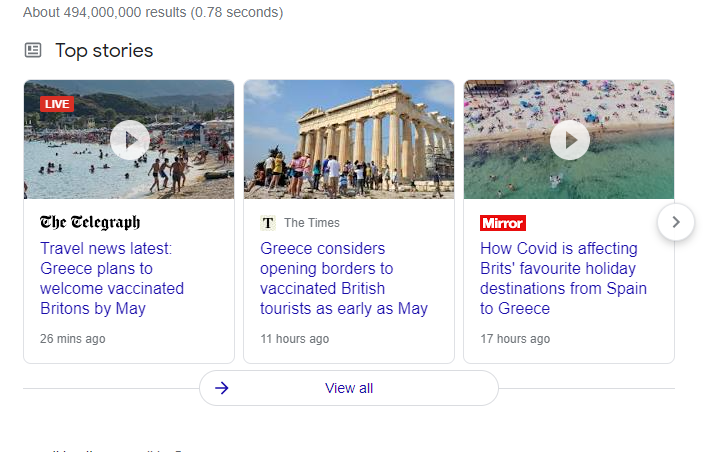
We have a very good covid trend now, comparing to other Mediterranean countries.
We all know that numbers are very relative and can shift very quickly. The past season has thought us how rapidly we can go from bliss to despair, and we couldn't do anything to prevent it, it was by far too late to react, it caught us very much off guard and we cannot allow ourselves to have last year repeat itself.
Every country has been affected this past year with covid, and we cannot rely upon or delude ourselves that because of the good geographical position and good "covid reputation" we will continue to see booking increase in "neutral driving mode". We have all heard how Spain, Italy, lately Portugal and Turkey have been hit by a coronavirus, but they all continue to be ahead. Following the trends and statistics by ETC follow:
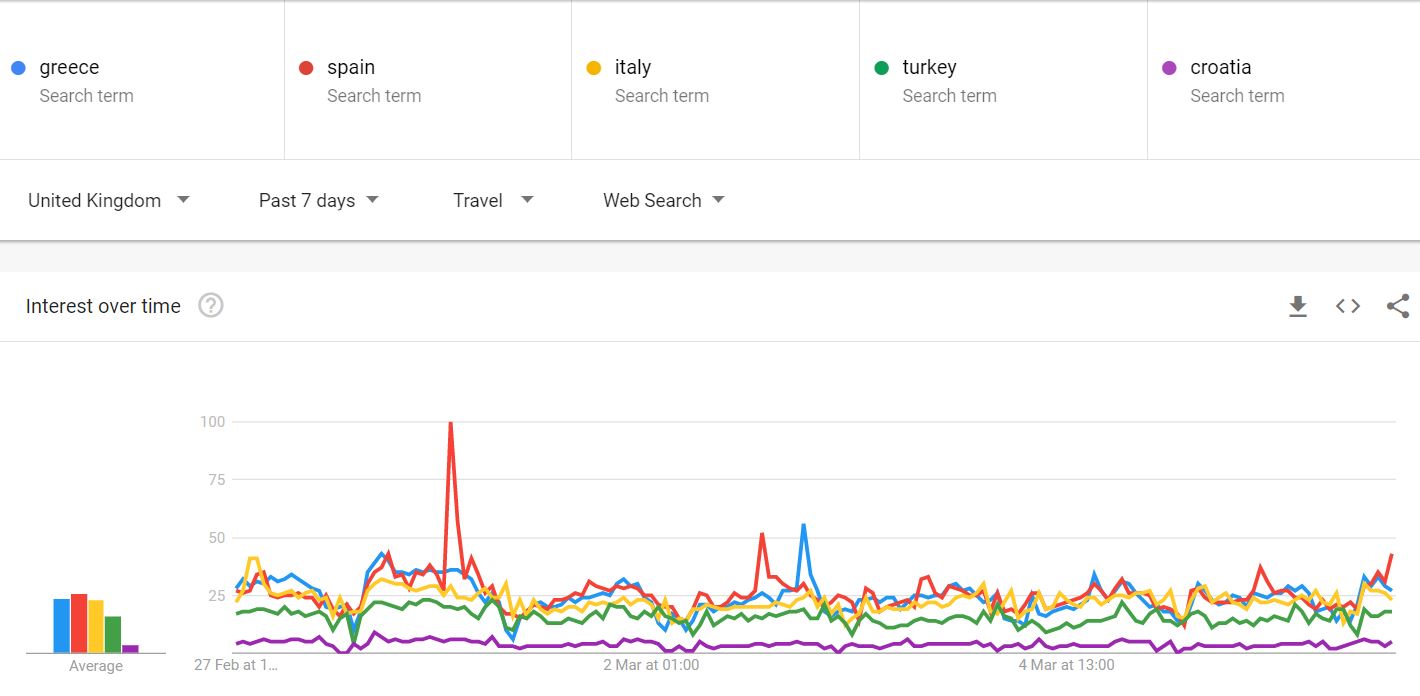
We need to catch that pace before the German government lift the restrictions and starts actively booking their next holiday.
If the German government persists with the idea of opening borders and lifting travel restrictions only for countries that maintain under 35 infected people on 1000 residents, what is the best way to respond? Maybe the answer lies in the Greek model, where they have split the country into many regions, each island is a region for itself, giving them a lot of manoeuvre space in preparation for the season.
The surveys constantly show and remind us that flexibility, no-prepayment and safe coming in and going out of the country, knowing under what conditions and from what date they can enter the country with clear information easily accessible online is what will define this season.
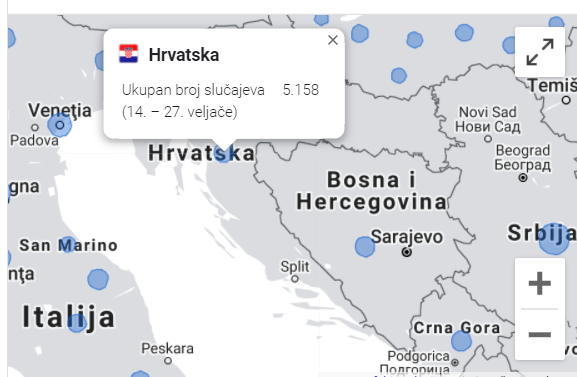
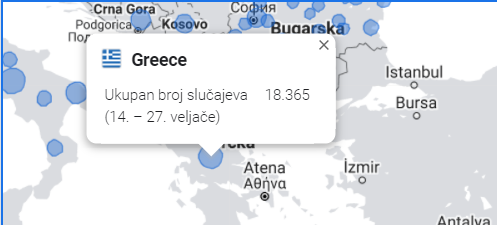
We believe that reminding not only driving distance markets but as well flying guest, of all the secluded places they can visit, from small quaint villages around Dubrovnik and Split to Islands where there are barely any cases at all, we could see a different booking pace from flying guest predominately British travellers, but that needs to be advertised.
Let's not forget we have the best of both world, the driving distance German travellers and British travellers getting ready to fly, let's keep reminding these countries how safe and beautiful Croatia is and help our tourist discover different places they can enjoy in Croatia (countryside< secluded, nature, Islands...) With so much diversity to offer, we should be setting the trends, not continuously trying to keep us with them.
We believe through strong marketing campaigns and good media coverage emphasizing how beautiful and safe Croatia is, presenting a set of protocols Croatia will be following and enabling a safe, quick and smooth entry for travellers (perhaps through vaccine passports or providing PCR tests at airports, hotels, etc), we may see a different booking peace similar to the one other Mediterranean countries are currently experiencing.
Interesting stuff. Anyone else have information and insights from where they are outside Croatia in key tourism markets. If you have expert comment you would like to share, backed up by links and data, please contact us on This email address is being protected from spambots. You need JavaScript enabled to view it. Subject 2021 season.
From Phylloxera to Apartmentisation, the Road to Nomad Land
March 6, 2021 - It is always a pleasure to publish the thoughts of Zoran Pejovic, one of Croatia's most respected tourism professionals. A word of warning to those rushing into the digital nomad tourism opportunity, looking back at the examples of phylloxera and apartmentisation.
At the end of the nineteenth century, the good people of Dalmatia got the word that the big wine-producing countries, France, and Spain primarily, lost almost all their vineyards due to the small but mighty pest called phylloxera. They rushed and dug all their olive groves, fruit orchards, and gardens and planted vines, hectares and hectares of vine, thousands of hectares. What followed was several years of amazing growth. The prices were going up and it seemed that the panacea for all the hardships of the hardworking people of the Adriatic coastline was in hand. Well, we know now that it was a terribly bad idea. Some people knew it at the time as well, but their voices could not be heard, as people did not want to hear it. Phylloxera reached our fine shores as well and wiped out all those thousands of hectares of the recently planted vineyards which led to a great famine and mass emigration to the Americas and elsewhere. In the meantime, French and Italian and Spanish growers “vaccinated” their vines by grafting them on the resilient American roots, and their life and wine production resumed. Ours almost came to a halt.
At the start of the twenty-first century, the good people of Dalmatia got the word that many of the countries that we saw as our competitors in the tourism industry disappeared from the map, mainly due to the geopolitical turmoil, wars being waged in the vicinity or some other factors that made them unsafe to travel. So, we rushed and turned all our houses, apartments, and garages into summer rentals. What followed was several years of amazing growth. The prices were going up and it seemed that the panacea for all the hardships of the hardworking people of the Adriatic coastline was in hand. Well, we know now that it was a terribly bad idea. Some people knew it at the time as well, but their voices could not be heard, as people did not want to hear it. Coronavirus reached our fine shores and wiped out our touristic output by 75%. The apartments for the major part are sitting empty and will probably do so second season in a row, and people are looking for the best emigration options.
The latest panacea on the shelves of the pharmacy of our lives is called “digital nomads”. Apparently, the big cities of the world are not the most pleasant places to be in and live in right now, and people are going to rush to our fine shores and set their IT shops and office, sip wine on the balconies of those empty apartments and leave us their money. People are digging trenches and bringing optic fibers to their houses on the islands, believing that with the high-speed internet connection and the unbearable blueness of our seas and skies it will be impossible to resist the call to join the movement of digital nomadry. While in essence a good idea, and a good PR stunt, albeit not nearly as good as the one from Dubai or some Caribbean islands, and one that I support in terms of legislation and easing of the bureaucratic burdens, I cannot help but feel like we are doing the same things all over again.
We keep looking for new trends and perhaps new directions, without ever establishing a clear identity. The digital nomad program cannot be our identity. It can perhaps be one of the trends or one of the directions we take, but it must stem from the strong, well-built, and easy-to-understand industry identity. We will not be able to build the identity until we understand the progression of economic value, from commodities to experiences and transformations. You simply cannot skip the steps and expect that the entire thing does not falter like a house of cards at the first sign of trouble. We have learned how to commoditize sea and sun, and that to a point only. How those commodities make goods that deliver services that set the stage for experiences that guide transformation is still to be understood for the vast majority of those who pertain to play the part in this industry of people aggregation, travel, tourism, hospitality, leisure, and all connected industry spin-offs. This is obviously not a problem of those who promote this program, which to reiterate once again, I fully support, but of those who keep looking for simple solutions to the complex problems. This a general human characteristic, but sometimes it feels we excel at it a bit more than the others. This will be short-lived solution, until next one surfaces and then we will all rush to root out our vines and plant the lavender. Oh, wait, that has already happened as well!
You can read more of Zoran's writings on TCN here.
For more about the digital nomad scene in Croatia, follow the dedicated TCN section.
Dubrovnik Cruiser Trends - Daring to Hope for Recovery in 2021
March the 5th, 2021 - Dubrovnik is very well known (both in a positive and a negative sense) for its cruise ships, and with the ongoing coronavirus pandemic still holding a firm grasp on tourism, just where do things stand? It seems that the Dubrovnik cruiser trends are improving, be that good or bad.
As Poslovni Dnevnik/Marija Crnjak writes, after the government lifted a previously introduced ban on large cruisers entering Croatian ports a few days ago, which was entered into force last year to fight the coronavirus pandemic, conditions were created for preparing for a tourist season that could be significantly better than last year for Dubrovnik, Croatia's main cruise destination.
According to the announcements of global cruise companies, Dubrovnik could generate 80 percent more cruise traffic throughout the year 2021 than it managed last year, or 60 percent of the pre-pandemic traffic seen back in 2019, but only if the epidemiological situation stabilises and the conditions for crossing European Union (EU) borders are properly defined as soon as possible.
In addition to the above, protocols for dealing with various possible scenarios should be introduced as soon as possible, from how to act in the case of an infected passenger onwards. Dubrovnik cruiser trends for this summer are hanging on many factors being properly accounted for, both at the national and at the European Union level.
The City of Dubrovnik has therefore prepared a draft protocol that Mayor Mato Frankovic sent to the Croatian Government on Wednesday, modelled on what both Greece and Cyprus boast, as these are currently the European countries most active in their work and efforts to see tourism make a comeback along their shores in summer 2021.
"We´re monitoring what our competitors are doing across the rest of the Mediterranean and we have used their solutions to compile our own protocols for action, and we expect to have the quick support of the Government, which responded to our request to define the situation with cruisers. We met several times with representatives of the World Association of Cruising Companies (CLIA) and agreed and defined everything, which was very important to do on time. That´s why we insisted, along with the Government, on the conclusion of a proper decision as soon as possible allowing large ships to enter. It is very important that shipping companies know their destinations on time, so that they can start selling tickets,¨ explained Frankovic when discussing 2021´s potential Dubrovnik cruiser trends.
Although there are a lot of inquiries when it comes to Dubrovnik cruiser trends for 2021, there is still work to be done to reach the maximum potential of the summer tourist season, according to the mayor, who mentioned the current bad epidemiological situation in Dubrovnik-Neretva County, which has already jeopardised some previously planned programmes.
“We should always keep in mind that Dubrovnik is just one of the destinations on any given cruise route and that everything will depend on the epidemiological situation. Thus, for example, the idea of cooperation with American Viking failed, due to the bad epidemiological situation in the county. In addition, some companies have launched programmes under some bilateral agreements between countries. For example, Royal Carribean has launched programmes for Greece, but only for guests from Israel, and only vaccinated ones,¨ Mato Frankovic pointed out.
Sales are beginning despite all uncertainties...
Royal Caribbean International has announced that it will launch a voyage from Israel in May, with a combination of a three- to seven-night cruise programme on the Greek islands and then on to Cyprus. Ticket sales start on March the 9th, and the cruises themselves will begin departing as of the month of May.
The programme is the result of a bilateral agreement to introduce the controversial ¨Covid passports¨ between Greece, Cyprus and Israel, and a mitigating circumstance is the high vaccination coverage of Israeli residents. On their new ship "Odyssey of the Sea", for which this is the premiere voyage, everyone over the age of sixteen will have to have been vaccinated against the novel coronavirus, SARS-CoV-2.
In fact, as discriminatory as the request for vaccination of tourists may seem and most do not officially advocate it, it seems that most cruise companies will ask their guests to be vaccinated against the new coronavirus at the time of boarding, to avoid "hostage crises" and additional related health complications.
Last week, the same move was announced by luxury travel company Crystal, which found when undertaking market research that this would be one of the criteria for their customers to choose a cruise. Prior to them, back in January, the British cruise company announced that it would ask all guests to be vaccinated two weeks before boarding.
The same criteria are being introduced by U.S. river cruisers, after their potential guests also said they would feel safer with fellow travellers who have been vaccinated against the virus. Frankovic pointed out that this actually suits the destinations that the ships are heading to.
"It will actually be convenient for us as destinations, and it will facilitate all of the needed protocols. For guests who have not had the vaccination, we will introduce a protocol for them to visit the city in small groups, as well as all institutions, museums, walls, for which there will be no need for vaccinated guests. There will certainly not be opportunities for cruise guests to tour the city individually like they did before,¨ he explained.
Frankovic is more than aware that the level of vaccination against the novel coronavirus in the destinations these enormous vessels head to is also of paramount importance. That is why the people of Dubrovnik are very active in getting everyone vaccinated as soon as possible, in order to welcome the summer tourist season as safely as possible.
So far, about 4,000 people have been vaccinated in Croatia´s southernmost city and tourist Mecca, a mass vaccination of about 1,000 citizens is planned for Monday, and by June, the majority of Dubrovnik´s residents plan to be vaccinated against the novel coronavirus, according to Dubrovnik Mayor Mato Frankovic, who still hopes Dubrovnik cruiser trends will manage to rescue some of this year´s tourist season down in southern Dalmatia.
For the latest travel info, bookmark our main travel info article, which is updated daily.
Read the Croatian Travel Update in your language - now available in 24 languages.
Jadran Crikvenica Weighs Up Upcoming Tourist Season with Caution
March the 5th, 2021 - Jadran Crikvenica stood out during a difficult 2020 for its continued business expansion despite the less than favourable economic circumstances which saw many other companies shelve planned investments and put their keys in their locks. How do things stand now?
As Poslovni Dnevnik/Suzana Varosanec writes, the Crikvenica-based hotel company Jadran was saved from bankruptcy´s proverbial jaws. After that, and after going through all of the associated pre-bankruptcy agony, it was privatised under the ownership of two pension funds and is currently facing a unique challenge, very well known in the Croatian hotel industry to smaller entities.
As touched on above, during the difficult pandemic-dominated year of 2020, Jadran Crikvenica was one of the few large Croatian hotel companies to significantly expand its business capacities, partly through the long-term lease of new capacities and partly through the reconstruction of existing capacities started back in 2019.
Could that fateful decision now end up firing back at them like a boomerang? Possibly. The treatment of new units when it comes to being permitted state aid for job preservation is not yet known and it is doubtful whether the development will be treated positively in order for the company to use this measure in the continuation of business activities in rented facilities for the Easter period. Perhaps it is better not to begin working yet, in the case that the turnover of accommodation units which were not in use back in 2019 is not excluded from the company´s income.
All these investments bring greater competitiveness and higher prices, and thus the comparison of revenues in 2019 and 2021 should be taken with a grain of salt. Things, under these dire circumstances, continue to sit firmly in the hands of the state, which would have no real negative effects if Jadran Crikvenica, as well as other such smaller entities in the tourism industry, were to be approved such measures, because if there was no lease agreement, the financial aid would be paid out to the actual hotel owners.
The high level of indebtedness of the parent company and the Jadran Group does not jeopardise current liquidity, but it is a logical business interest that the capacity for hotel business within Jadran Crikvenica, which increased by 25 percent last year in the sense of solid capacity and more than 17 percent in terms of total capacity, do not just sit there empty.
They still have a lot of units of lower categories, but for the second year in a row they have to consider the Lisanj Hotel in Novi Vinodolski, which will have 220 accommodation units, and the Garden Palace Resort in Umag with 109 such units. Hotel Noemia in Baska Voda also has 63 4-star accommodation units.
All these new capacities were created as a classic "green feel" or through the reconstruction of existing old capacities of a lower category. These are facilities that are new, and were taken out on a long-term lease precisely in order to create the preconditions for extending the tourist season, and thus enable the better use of existing resources, with an emphasis on the employment of permanent workers.
While the Esplanade Hotel in Crikvenica opened its doors this Monday, for the hotels in Novi Vinodolski and Umag, as they claim, management wants the same because of the high quality and the fact that they are located in destinations one can more or less easily drive to.
"By opening up these facilities, we want to send out the message that we are here, we´re present on the market, and that we are above all else confident in these new circumstances, and that is why we want to enter the market as soon as possible," said Jadran Crikvenica´s CEO Goran Fabris.
With the earlier opening of these facilities, new revenue wil be generated, the local tourist board will be able to collect the sojourn/tourist tax, the state will get its VAT, and employees will actually be able to do some work, which brings with it higher salaries. However, the prices realised in the early season are not at the level of those in the peak of it, so profitability is naturally reduced. Looking exclusively through the glasses of maths, sometimes it is better not to work and exercise the right to grants instead, than to work and lose that right entirely.
For the latest travel info, bookmark our main travel info article, which is updated daily.
Read the Croatian Travel Update in your language - now available in 24 languages.
Croatian Travel Agency Association Finally Succeeds, State Aid Arriving
March the 4th, 2021 - Croatian travel agencies have been by far the hardest hit by the ongoing coronavirus pandemic as travel for tourism and leisure remains almost impossible. Luckily, but following many appeals, the Croatian Travel Agency Association has finally been heard by the government and state aid is on the way.
As Poslovni Dnevnik writes, the Croatian Travel Agency Association (UHPA) has welcomed the recently announced decision of the Croatian Government to include tourist agencies in the measures for state aid/compensation for endangered economic activities. Although better late than never, it is difficult to understand how those representing Croatia´s most lucrative economic branch were not taken care of far earlier.
"I´m going to say just one word - finally. Finally, the requests and appeals we´ve been sending out to the relevant ministry and the Croatian Government for months, warning of the difficult situation in which the tourism industry, and especially travel agencies find themselves find themselves, have borne fruit,¨ said Tomislav Fain, President of the Croatian Travel Agency Association.
According to the data of the Tax Administration and the Central Bureau of Statistics (CES), the average decline in the economic activities undertaken by Croatian travel agencies during 2020 was continuously above 85 percent. These utterly devastating results carry even more weight if we take into account the fact that these are mostly small and medium-sized family businesses that, in order to ensure the liquidity of the business, among other things, were forced to sell off their own assets.
The Croatian Travel Agency Association has therefore persistently sent out proposals for assistance and compensation models to the competent state institutions, following the example of other EU member states, which have adopted measures aimed exclusively at travel agencies and tour operators, aware of the gravity of the problem and the possible consequences of their illiquidity.
"None of us are happy with the helplessness we´ve found ourselves in, nor with the uncertainty from month to month as to whether the subsidies for preserving jobs will be extended, but we can't do this. Instead of planning spring trips across Europe and looking forward to the arrival of the first guests for the Easter holidays, we find ourselves in a situation where state measures are our only means of salvation. As, unfortunately, the end of the pandemic is not yet in sight, we´re faced with the problem of unrealised trips and we´re as such highlighting the need for changes in the legislation and the announced state aid programme, as it is extremely important in order to restore the damaged trust of our customers,¨ added Fain.
"Tourism as we knew it before the pandemic is now a thing of the past. While we´re dealing with our multiple existential problems and fighting for survival, the battle for each guest is well underway. It is high time that we all move from words to deeds and everyone in their segment needs to give their all and we need to justify the title we have given ourselves as the best destination in the Mediterranean,¨ concluded the President of the Croatian Travel Agency Association.
For the latest travel info, bookmark our main travel info article, which is updated daily.
Read the Croatian Travel Update in your language - now available in 24 languages.
How are Croatian Hotels Preparing for Upcoming Tourist Season?
February the 27th, 2021 - What awaits Croatian hotels and how are they preparing for the upcoming tourist season this summer as investments were forced to a halt by the coronavirus crisis in 2020?
As Marija Crnjak/Poslovni Dnevnik writes, although the fourth quarter has been a period of cost generation for tourism companies across Croatia in normal, pre-pandemic years, in addition to revenue, in 2020, as expected, all records were broken, in the sense of them all being in the red.
However, thanks to state measures, moratoriums placed on loans and the like, Croatia's leading large tourism companies have managed to maintain the stability they need to realise the season ahead. Annual results for 2020 show that, although everyone has shelved most large investments and postponed them for better times, some investments have been completed or will be on the eve of the 2021 summer season. Croatian camps had the highest turnover last year, which affected the average price and profitability, and the best turnover was achieved by the premium segment, with Rovinj standing out in that regard.
When it comes to Croatian hotels and those which dominate, throughout 2020, the Valamar Riviera Group generated total revenues in the amount of 697 million kuna, a mere 31 percent of the total revenues the company generated in the record year of 2019. Despite unfavourable business circumstances, the group generated 2.3 million overnight stays and positively adjusted the EBITDA in the amount of 126 million kuna in 2020, but ended the pandemic-dominated year with a total loss of 359 million kuna, unlike the year before in which they had profit of 306 million kuna. Valamar's net debt increased by 29.9 percent in 2020, from 2.19 billion kuna to 2.85 billion kuna.
For 2021, the Supervisory Board of Valamar Riviera approved investments in the amount of 132 million kuna intended for the finalisation of previously planned/started investments (more precisely in the Istra Premium Camping Resort and accommodation for employees down in Dubrovnik), the completion of the first phase of investments in Valamar Pinea Collection Resort and the digitisation projects, investments in the maintenance and preparation of future projects. Reduced investments planned for 2021 are focused on the completion of started projects and the preparation of projects for new growth and development when the conditions are right.
The Supervisory Board of Imperial Riviera, which includes Croatian hotels in Makarska, Rab and Porec, approved investments in the amount of 41 million kuna and are primarily focused on the completion of investments in their hotels in Makarska and in Porec. This company had 90 million kuna in sales revenue last year, which is almost 65 percent less, operating profit amounted to 23.2 million kuna, which is a decrease of almost 75 percent, but excluding the effect of state aid received in order to preserve jobs, as well as various concessions, the EBITDA remained positive. The group's net loss amounts to -39.7 million kuna.
Maistra, including Dubrovnik's Hilton Imperial, recorded 45 percent of sales throughout 2020, with 41 percent of sales of goods and services. Segment analysis shows that in 2020, camps performed 9 percent better in terms of the number of units sold than the Maistra average stood at. In the period from June to September, when business able to be done without significant restrictions due to the country's epidemiological measures, the best sales compared to last year were achieved by the luxury hotel segment in Rovinj.
The management of the Arena Hospitality Group, known for its Croatian hotels and hotels abroad, has especially pointed out in their report on the matter that they are financially ready for another challenging year.
''Our financial position is still strong, amounting to 425.6 million kuna as of the 31st of December 2020. The various analyses we have conducted can ensure that the group has sufficient funds to be able to withstand uncertain operations throughout 2021, while market conditions are not stabilising,'' they stated from the company, whose pandemic revenue was slashed by 69.4 percent last year to 238.3 million kuna with an EBITDA loss of 18.3 million kuna, compared to a profit of 229.5 million kuna in pre-pandemic, record 2019.
For the latest travel info, bookmark our main travel info article, which is updated daily.
Read the Croatian Travel Update in your language - now available in 24 languages.
Which Croatian Towns Can Count on Tourism in Summer 2021?
February the 27th, 2021 - Croatian towns could finally feel a hint of normality this summer as bookings from Northern European countries are on the rise and a plan to bring back tourism is worked on.
As Poslovni Dnevnik/Marija Crnjak writes, although the British market was naturally expected to rush to book a summer holiday after the announcement of the easing of measures against the spread of the novel coronavirus, even travel organisers who regularly monitor the market were pleasantly surprised by the sheer growth of British bookings.
EasyJet thus announced an increase in flight bookings from the United Kingdom for this summer by more than 300 percent compared to just one week ago, and bookings for summer holiday packages increased by more than 600 percent compared to a week earlier.
Travel organiser TUI UK is reporting a 500 percent increase in booking compared to a week ago, and Jet2 has revealed that their growth is above 600 percent. On the Skyscanner site in just one day, they had a 69 percent increase in bookings.
As has unofficially been found out, TUI UK is currently recording 66 percent more bookings for Croatia than it did during the same period last year, of which more than half is booking for Dubrovnik, for August and September.
"As things stand now, while some Croatian towns will be able to count on the pre-season to some extent or another, that isn't the case for the whole country.
Germany, the Netherlands, Austria, Belgium won't allow for such leisure and tourism trips before May the 15th or even early June, and the Scandinavians aren't to be expected before July. Currently, the best sales are in August, September and even October, which all stakeholders in Croatian tourism should take into account and they try to profit as much as possible from the interest we've been recording in the market. Judging by this optimism that we're finally seeing, Dubrovnik could be full at the end of summer and in September, as might Split, while Istria and Kvarner have the benefits of being typically car destinations,'' revealed a source from TUI.
No concrete figures have been revealed yet because the starting points for this jump are low for everyone, but tour operators are finally seeing the light at the end of a very long, very dark tunnel, because the reaction shown by the British market can now also be more or less expected in other markets as measures ease.
Croatia can have certain advantages if it carries out its tourism campaigns properly, and focuses especially on the end of summer and even the post-season, which could be a shining star. Although Spain is their favourite destination, the British are still not welcome there because of the British strain of the virus, nor are they yet welcome in neighbouring France.
Greece, however, has put enormous amounts of effort into bringing tourism back to their shores amid the pandemic, and bookings from the UK have shot through the roof.
"Greece has worked hard to make its comeback, it engaged agencies in all emitting markets, developed a return strategy, worked out bilateral agreements with certain emitting markets on border crossings and these are the results," said interlocutors from the sector, who believe that Croatia needs to work hard on defining all of that as soon as possible. Testing, vaccinations and everything that has sadly become the norm of late all need to be carefully looked into to facilitate any sort of tourism for Croatian towns and cities this summer season.
However, the Croatian tourism authorities are keeping their cards close to their chests and are waiting for the European Union's common position on these issues, and in the meantime their focus is on the Safe Stay in Croatia certification and campaign project, presented on Thursday by Minister Nikolina Brnjac and Kristjan Stanicic, director of the Croatian Tourist Board (HTZ).
"During the preparations for this tourist year, we're putting the safety and health of our fellow citizens and our guests in the first place, and we have the support of the sector, gathered in the Council for Recovery and Development of Tourism. With the prescribed protocols, we've covered more than 200,000 catering and hospitality facilities and service providers in tourism,'' pointed out Brnjac and added that it is important to ensure that this national label is available to all stakeholders in Croatian tourism and the travel chain.
The CNTB will carry out campaign activities during March and April across the European markets of Germany, Austria, Italy, Poland, the United Kingdom, the Czech Republic, Slovakia, Hungary, France and the Netherlands.
For the latest travel info, bookmark our main travel info article, which is updated daily.
Read the Croatian Travel Update in your language - now available in 24 languages.
Is Croatian Charter Tourism Path Forward for 2021 Tourist Season?
February the 26th, 2021 - With pandemic-dominated 2020 now behind us, preparations for 2021's tourist season are underway in equally precarious and unstable circumstances. Is Croatian charter tourism something that much more focus should be placed on this year?
As Marija Crnjak/Poslovni Dnevnik writes, the solution for re-launching air transport in 2021, with which many companies will still have financial and logistical problems with the introduction of scheduled and even low-cost flights, could be charter flights, a concept that Croatia has never adopted unlike its competitors in the Mediterranean.
Although guests who can arrive in the country by car are expected in Croatia this season as well, Poslovni's interlocutors have pointed out that the country should not give up trying when it comes to airlines and air passengers, as he are big spenders and here is a high level of inerest in coming to the Adriatic from them this summer.
While we're waiting for air traffic to approach the dynamics that might resemble anything remotely like 2019 when it comes to regular air routes, charter flights will be the fastest and most efficient solution that will work to activate what are currently all but destroyed travel agencies, but not without public sector investment.
The above has also been shown by the dynamics of the market, after the recent establishment of a new Croatian charter company, ETF Airways, this was the founding of a Croatian startup for air charter for the spring which was announced by the founder of the German company Sundair. Last weekend, Slovenian tourists even managed to go on holiday to Tenerife thanks to the Palma agency charter.
"Croatia now has the opportunity to finally understand the advantage of charters, as well as the importance of connecting all stakeholders in tourism, and especially the importance of Croatian charter tourism companies that can bring in many tourists. The move would bring man benefits, especially this summer.
Such companies cover destinations and departures that aren't covered by regular scheduled flights, they bring guests who wouldn't otherwise come - guests need a sunny destination after a long, depressing winter and repeated coronavirus lockdowns, be it in Turkey or Spain or here on the Adriatic, and more than ever they need security and a guarantee that they'll manage to arrive at their final destination quickly and safely.
All Croatia needs to do is work out and come up with some good packages with such agencies, which include direct flights with a guaranteed departure,'' claimed Stjepan Bedic, the director of ETF Airways, an aviation enthusiast and entrepreneur who has travelled the wider region with this business.
Bedic also stated that Croatia has so far underestimated the advantages of charters and instead grants have been given to those who already have a commercial interest in flying to Croatia.
He believes that the Ministry of Tourism and the Croatian National Tourist Board (HTZ) should support Croatian charter tourism and domestic air charter companies that could bring guests in the low season and make a promotion in the emitting markets, either through various regulations or with programme subsidies.
"It's something that has boosted Turkey's tourism over the last decade - thanks to arrangements with charter companies and tour operators backed by the Turkish Government, guests have flown to Turkey and brought with them huge traffic to various Turkish destinations, filling hotels and restaurants. Over recent days in particular we're seeing great interest from Russian guests to come to the Adriatic, and Croatia hasn't yet allowed them to obtain visas on arrival, so that's a solution which is necessary in times when we have help tourism recover,'' explained Stjepan Bedic.
For the latest travel info, bookmark our main travel info article, which is updated daily.
Read the Croatian Travel Update in your language - now available in 24 languages.
Dutchman Promotes Croatia Globally: Meanwhile, in the Kingdom of Accidental Tourism...
February 26, 2021 - A Dutch entrepreneur in Split is spearheading an incredible PR campaign for Croatian tourism as a volunteer. Meanwhile, in the Kingdom of Accidental Tourism.
Two different approaches to tourism promotion in Croatia.
In the first, a successful entrepreneur from Holland who has been living in Split since 2006. With no connection to tourism whatsoever, he was intrigued by the concept of a digital nomad visa for Croatia and the benefits it could bring. An open letter on LinkedIn to Prime Minister Plenkovic started a journey which saw Croatian bureaucracy move at lightning speed, with the first digital nomad visa issued just 199 days after Plenkovic announced his intention to make Croatia only the fifth country in the world and the second in Europe after Estonia to offer it. Meet Melissa Paul, Owner of Croatia's First Digital Nomad Visa.
Jan de Jong is now switching his focus to growing tomatoes and creating jobs in northern Croatia with a fantastic CROP Hrvatksa project which TCN featured recently. As far as I know, he is doing all this for free (and incurring expenses) because he is passionate about exploiting the many opportunities he sees in Croatia where others do not.
I have to admit that it is wonderful to watch him on his journey, and if you have a few minutes, then check out some of his presentations on YouTube, such as this one at LEAP Summit about Living the Croatian Dream.
The second approach to tourism promotion comes from the Croatian National Tourism Board, also known in some circles as the Kindgom of Accidental Tourism. With an annual budget of (I think) around 400 million kuna and 70-80 full-time staff, as well as (presumably) some tourism expertise, one might think that the Kings would be killing it promoting Croatia, especially when compared to one foreigner with no tourism expertise volunteering his time.
So how is it going?
As Jan posted recently on LinkedIN (see lead photo), it is going very well indeed. There has been outstanding coverage from CNN, Washington Post Euro News, Lonely Planet, Forbes and many more. The digital nomad topic hot right now, and his efforts combined with several others, have put Croatia at the very centre of that global discussion. Global media networks are now reaching out to Jan - expect some more great coverage of Croatian tourism in the coming weeks thanks to his efforts.
For free.
As a Dutchman trying to focus on growing tomatoes.
I was curious to see how the Kingdom of Accidental Tourism, with that huge budget and manpower, would be responding to the latest free gift to come its way. Only after I saw this message on the Total Croatia Travel INFO Viber community did I decide to check how the Kings were rising to the challenge.
This is what you get it you search for 'digital nomad' on the Croatian National Tourist Board website. Just a few days ago, CNN did a fantastic piece on nomads and the Croatian lifestyle.
I guess at least there are no spelling errors on this page.
As representatives of the Kingdom have correctly stated, I am no tourism expert, but I do wonder how hard all this is, especially if you have 70-80 brains and around 400 million kuna working on it. It doesn't even have to cost very much. TCN interviewed a love American nomad couple on Hvar, which led to HRT contacting us and a fantastic feature last night on HRT Puls. Above is the trailer - I will upload the full feature when it is online.
Cost zero. Done by a volunteer.
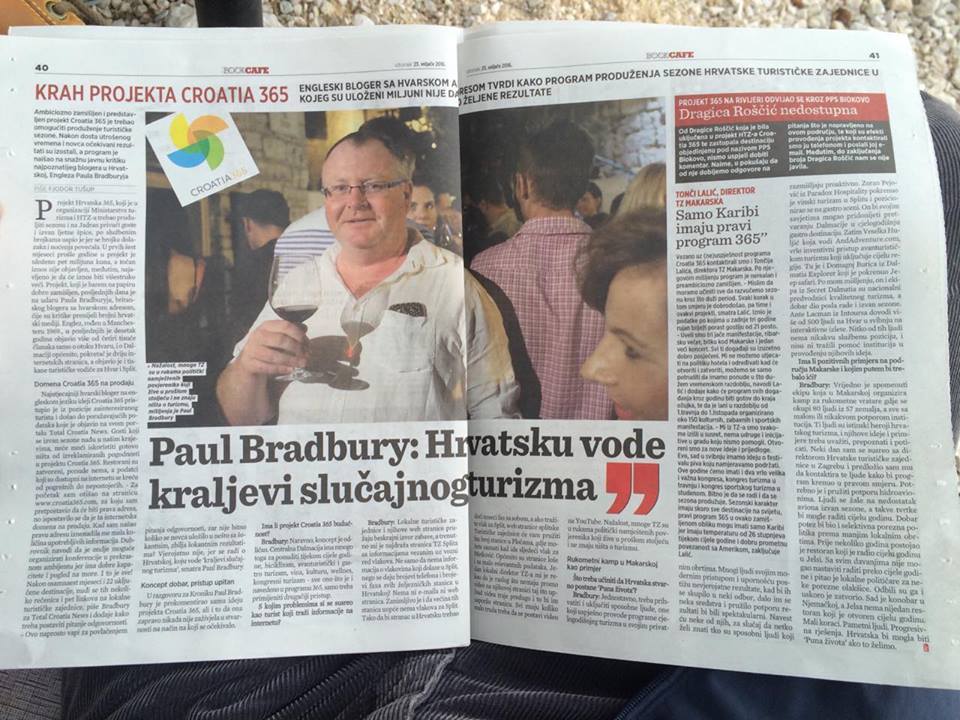
Facebook Memories told me this week that it is five years since the birth of the Kingdom of Accidental Tourism. Things are even more accidental now.
The latest 7-year tourism strategy, which never has anything to do with reality, has now finished. Of the many lofty goals prepared by experts for the 2013 - 2020 period, not one of the 30 projected golf courses was built, for example.
There is no replacement strategy as yet. Has anyone even noticed?
I have a suggestion. Why not give 2% of that 400 million kuna budget to the Dutch tomato grower to see what magic he could do with just a small budget? He has more than shown proof of concept with zero kuna.
For more on the digital nomad story in Croatia, follow the dedicated TCN section.


